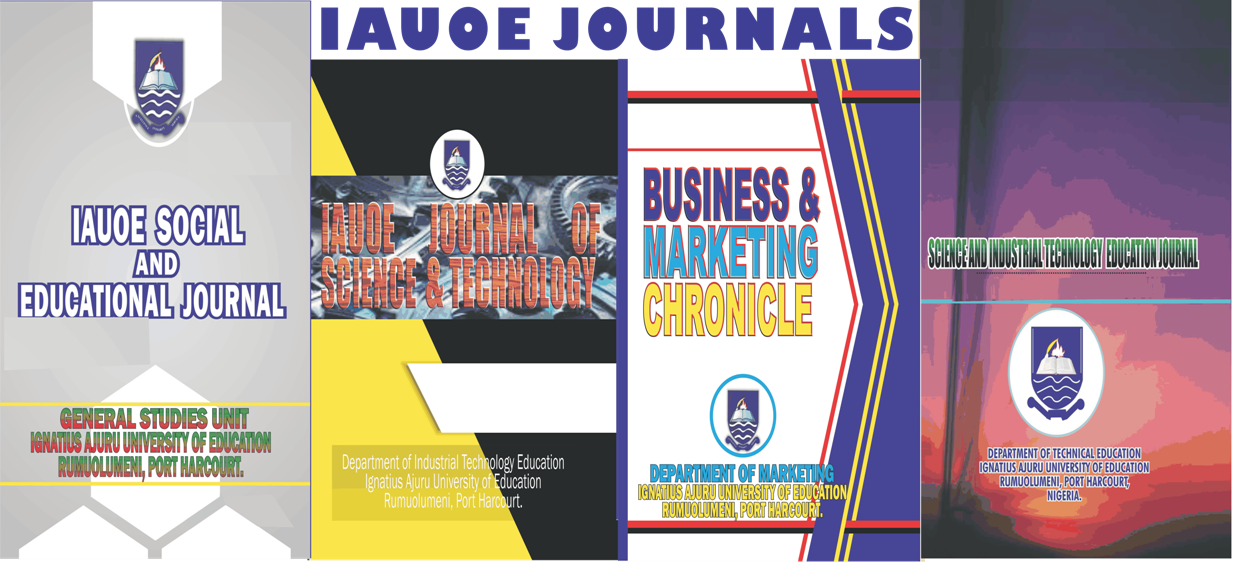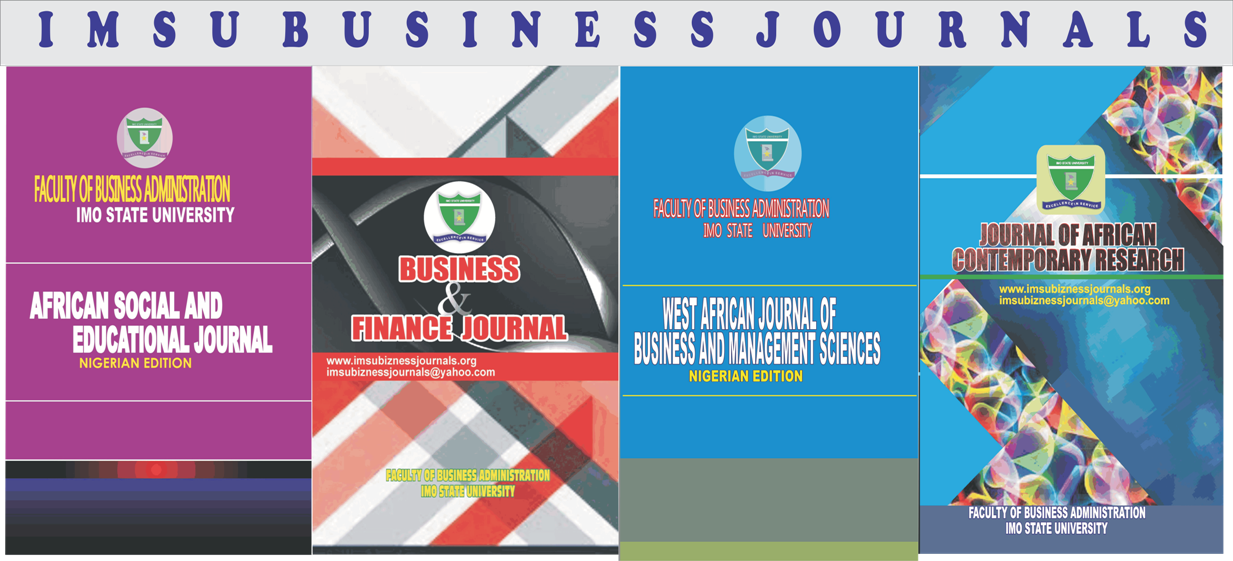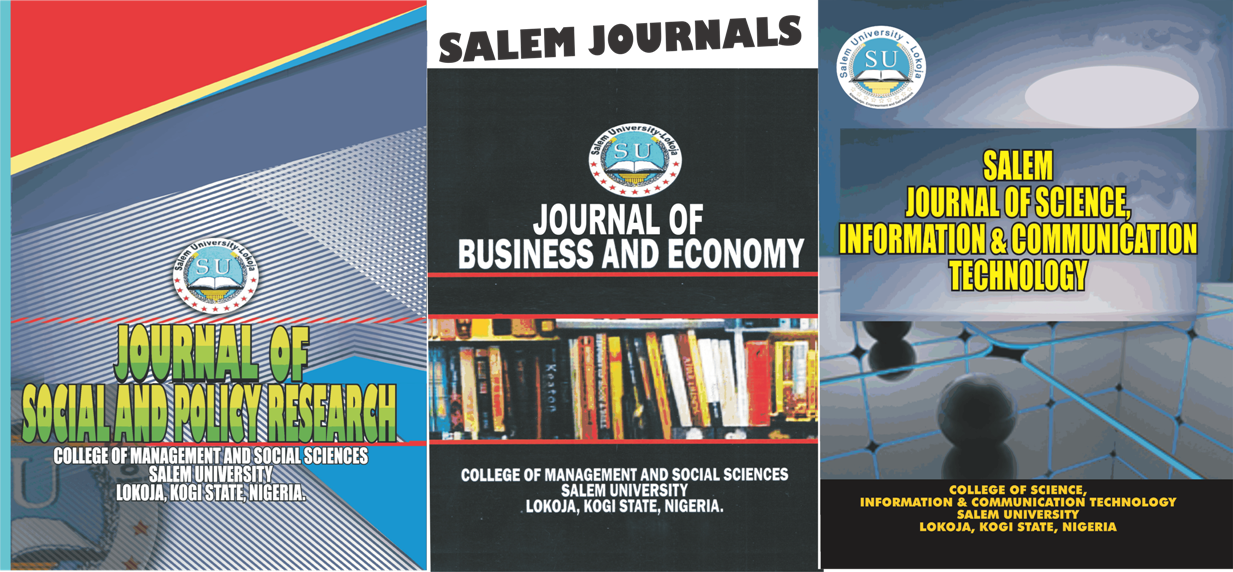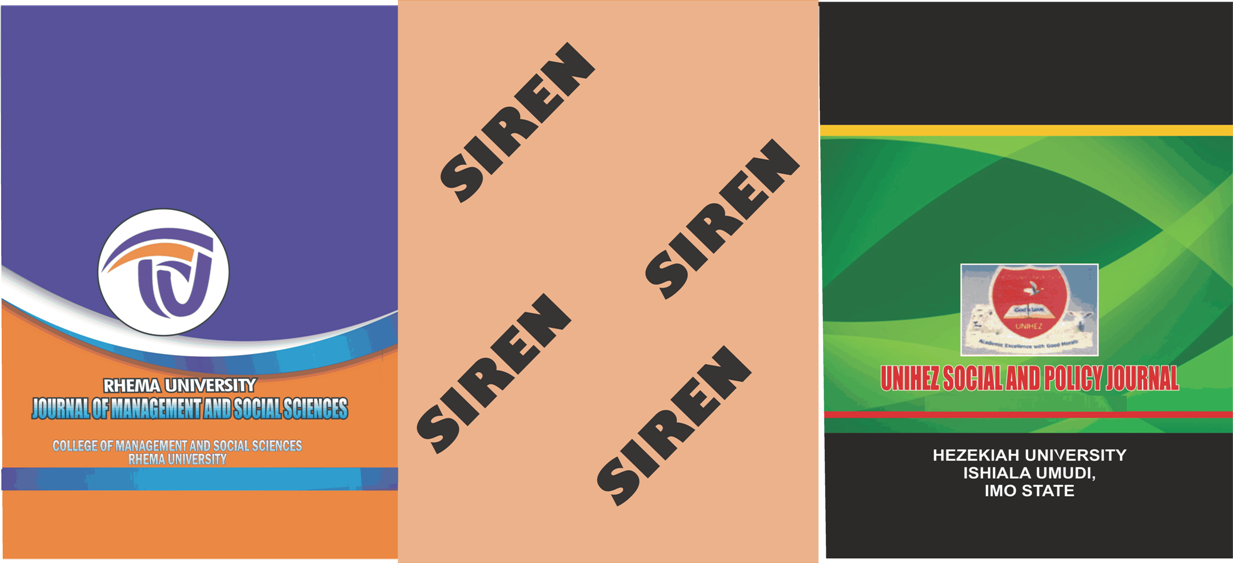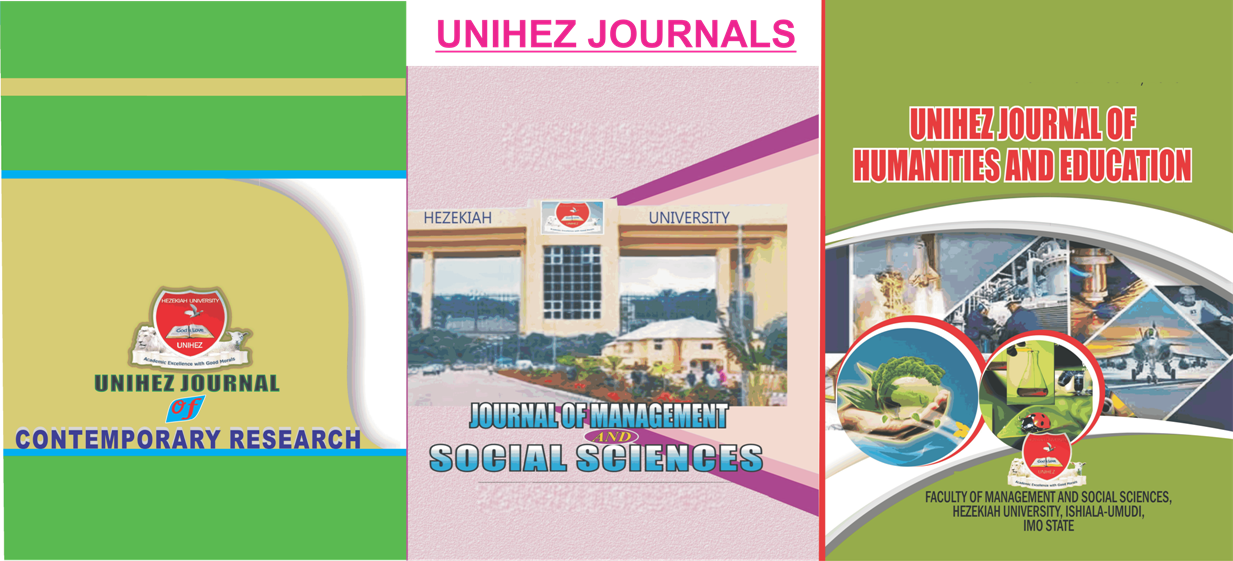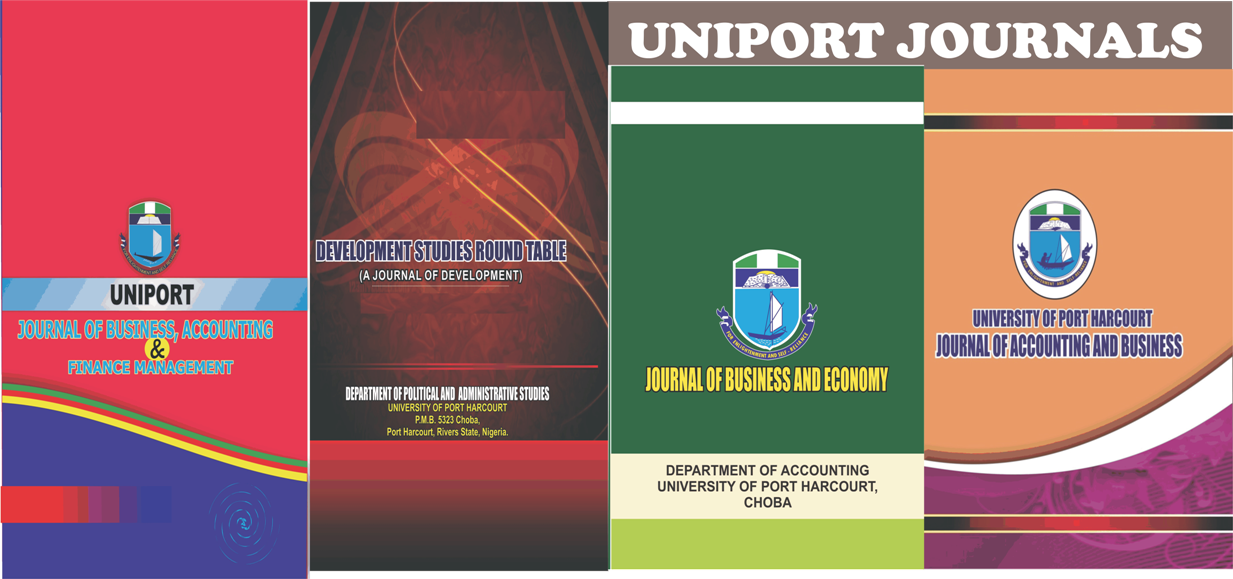2022 Archive
| 1 |
Title: RE-EVALUATION OF THE RELATIONSHIP BETWEEN ECONOMIC GROWTH AND PUBLIC EXPENDITURE IN NIGERIA.pdf Author: UDOCHUKWU GODFREY .O, UNIAMIKOGBO .E, EJEM CHUKWU .A & OBINNA NGOZI .B Abstract: Abstract This study re-examined the contribution of public expenditure on economic growth mostly now the macroeconomic variables look stifled around the globe. Data for this study were obtained from the Central Bank of Nigeria Statistical Bulletin for Economic growth proxied by the Gross Domestic Product, Government Recurrent Expenditure, Government Capital Expenditure and Government Total Public Expenditure from 1981 to 2021. Error Correction Mechanism was employed to estimate the relationship between economic growth and public expenditure. It was found among others that capital expenditure and total public expenditure significantly impact economic growth in Nigeria, while recurrent expenditure exerted insignificantly on economic growth. Consequently, the researchers are suggesting that government should restructure recurrent expenditure to significantly contribute to growth of the economy. Furthermore, government should consider more allocation on capital expenditure since it contributes significantly to the economic growth in Nigeria. Keywords: Public expenditure, Gross domestic Product, ECM, Nigeria. View |
| 2 |
Title: ECONOMIC DECISIONS AND SERVICE DELIVERY A STUDY OF MICRO SMALL AND MEDIUM SIZE ENTERPRISES (MSMES) IN LAGOS STATE, NIGERIA.pdf Author: A. O. AJAYI-OWOEYE, F. F. ADEGBIE & O. O. BAMISHE Abstract: Abstract Service quality is an important mechanism for business survival and growth and its measure of business’ performance, helping an enterprise to face competitors with a sustainable competitive advantage. The paper investigates the effect of economic decisions on service delivery of Micro, Small and Medium Size Enterprises (MSMEs) in Lagos State, Nigeria. Economic decision was measured using four proxies such as access to finance, access to customer, infrastructure development, and fiscal policy. The study reviewed past studies related to economic decision, service delivery and MSMEs in across different sectors and fields of study. A survey research design and simple random sampling technique were adopted to distribute four hundred and thirty-eight (438) questionnaires among the MSMEs in Lagos State, Nigeria. The study conducted a pilot study on each proxy of economic decision and service delivery in Ogun State using Cronbach Alpha reliability test and the value obtained was greater than 0.7. Descriptive and inferential statistics were used in this study. In the findings, all proxies of economic decisions were found insignificant. Hence the study concluded that economic decisions do not have a significant effect on the service delivery of MSMEs in Lagos State, Nigeria. The study recommended that every MSMEs should take proper measures with stakeholders and the management as well as the decision-makers on how to improve the enterprises’ supervisory decision and provide the schemes of service to the development of the businesses and increase in their targets. Key Words: Economics decision, Non-Financial Performance, Service Delivery, Small and Medium scale Enterprises View |
| 3 |
Title: HUMAN RESOURCE ACCOUNTING INFORMATION DISCLOSURE AND FIRM VALUE.pdf Author: GRACE OYEYEMI OGUNDAJO, OLUWATOBI ABODUNRIN KUJORE & SHAMUSIDEEN KEHINDE KASSIM Abstract: Abstract Every organization continually leverage on innovations and practices that will enhance its overall performance and improve its value. Overtime, it has been recorded that accounting practices to a large extent, impact upon the value of a firm. Traditional accounting practices involve the reporting of financial statements and statements of the value of assets. However, recent studies have shown a move towards a more inclusive accounting reporting that includes human resource accounting information. On this note, this study examines the relationship between human resource accounting disclosure and the value of a firm. This study used the ex post facto research design to by relying on already existing data to investigate the variables examine the effect of human resource accounting information disclosure to firm value. In addition, cointegration test was carried out to determine the perceived and predicted value of the variables in addition to discovering the correlation between the variables. The analysis of the data revealed that the disclosure of employee training and development significantly impact on form value. In essence, this study concludes that there is a significant impact of human resource accounting disclosure on a firms value. Keywords: Human resource, human resource accounting, accounting disclosure, firm value. View |
| 4 |
Title: BANK CREDIT AND FINANCIAL PERFORMANCE OF LISTED MANUFACTURING FIRMS IN NIGERIA.pdf Author: MONDAY, MONDAY AKUNNA, ANDREW NNAMDI ONYEGBULE&GBOMOR, MONDAY GBOMOR Abstract: Abstract The epileptic view of the growth of the economy tends to also feature an unsustainable performance of the sectors of the economy bearing it. It is also assumed that unsustainability of the sectoral performance could be interpreted to mean that the lending power of the Banks amongst others is questionable. Therefore, this study investigated bank credit and financial performance of selected listed manufacturing firms in Nigeria: between 2015 -2020. In order to carry out this study, objectives were posed, which are to investigate the relationship between loan and return on asset (ROA) of listed manufacturing firms in Nigeria and to ascertain the relationship between banks’ overdraft (BO) and net profit margin (NPM) of listed manufacturing firms in Nigeria. The research design adopted was the quasi-experimental design. The population was all manufacturing companies listed in the Nigerian stock exchange and sample for the study is made up 20 selected manufacturing companies using the purposive/judgmental non-probability sampling technique, secondary data was used and standard econometric procedure was adopted to analyze the relationships between the variables under study with the aid of E-view. The study found that bank loans have no significant relationship with Return on assets of listed manufacturing firms in Nigeria and overdraft have significant relationship with return on assets of listed manufacturing firms in Nigeria. Based on the findings of the study, the researcher recommended among others: The Federal Government should focus more of its attention on the manufacturing sector since the analysis show a positive growth and performance feature in the application of financial resources for attractive returns and profit generation. There is need for the CBN to reappraise the exiting procedure to get loan, as the high interest rate applicable on loans are disincentive to the financial performance of the manufacturing firms in Nigeria. View |
| 5 |
Title: EXCHANGE RATE VOLATILITY AND FOREIGN DIRECT INVESTMENT NEXUS.pdf Author: FREDERICK N., IFIONU, E.P. & OGUNBIYI, S. S. Abstract: Abstract Motivated by the poor and dwindling level of foreign investments, the study examined the evaluated the impact of Exchange rate volatility on Foreign direct investment in Nigeria from 1986 to 2020, using secondary sourced data gotten from the Central bank of Nigeria Statistical Bulletin. The analytical techniques employed by the study include; stationarity test, Johansen cointegration test, Error correction model and the Pairwise Granger Causality test. The study uncovers that; the rate of exchange rate volatility directly mimics the increasing level of Foreign Investment in the agricultural sector. Foreign Investment in the service sector is identified to possess insignificant influence on the exchange rate fluctuation showing how furtive the foreign investment in the manufacturing/industrial sectors and foreign investment in the service sector investments have been towards the exchange rate fluctuation of the nation which may likely be due to misappropriation and leakages coupled with poor economic, social and political stability. The study recommends that the government should foster its appropriation of capital and recurrent expenditure on improving the productive dominance of the nation and eliminate room for insecurity and political turmoil. It was also recommended that the government should also endeavor to mop the leakages in accrued foreign investment in the service sector, to foster the influence of this resource on the nation and reverse its insignificant influence. Since Foreign Investment in the service sector fails to relate with exchange rate volatility, the nation should endeavor to create a transparent avenue to collect and expend received Foreign Investment in the service sector and policymakers and financial institution should strive to polish the foreign direct investment system as it greatly predicts the exchange rate volatility proper regulation of the foreign inflows and ensuring strict monitoring of illicit activities such as cybercrime. View |
| 6 |
Title: FINANCIAL-TECHNOLOGICAL ADVANCES AND FRAUD IN NIGERIAN-LISTED DEPOSIT MONEY BANKS.pdf Author: ALU, CHITURU.N, AKINSANYA, .D, SHIYANBOLA, A.A & OLOWU P.A Abstract: Abstract Incidence of Fraud resulting in financial losses continues to pose a significant challenge to many industries despite advances in fraud detection technologies. Large-scale Fraud has occurred in Nigerian banks, which has resulted in bank distress at different times, among other reasons. This study examined the effect of financial and technological advances on Fraud in Nigerian-listed deposit money banks. A survey was employed in the research. The sample size of 198 members of staff in deposit money banks, Sagamu, Ogun State, Nigeria was utilized. Data for the research were obtained through a questionnaire. Responses were obtained from 188 eligible respondents and analyzed using descriptive and inferential statistics. This study indicates that technological advances significantly affect fraud detection in Nigerian listed deposit money banks (Adj.R2= 0.362, F = 36.320, p View |
| 7 |
Title: TAXATION AND NATIONAL DEVELOPMENT IN NIGERIA POLICIES, PROBLEMS AND PROSPECTS..pdf Author: FATOKE TOYIN VICTORIA And FATOKE ADEDEJI Abstract: Abstract Taxation as a crucial fiscal policy measure is a factual tool for social economic development, which has been adopted by various countries around the world to improve their economic goals. The objective of this study is to examine the impact of taxation on national development in Nigeria. Exploratory research design was adopted with comprehensive review of related literature that addresses taxation and national development. The findings confirmed that taxation is a stimulus for economic growth and development, as seen in other developed and developing climes. In Nigeria context, the effect of taxation on national development has not been felt the way it should, considering the relatively low revenue generation over the years and its minute impact on infrastructural development. This setback in infrastructural development was attributed to factors such as tax evasion, poor sensitization of tax payers, corruption, tax law loopholes leading to tax avoidance, poor accountability of tax revenue, fragmented data base of tax payers, impede electronic medium of tax collection among many others.Against the foregoing, study recommends that the Nigeria government should embrace the system employed by most developed countries in tackling the needs of its citizens through the effective use of tax revenue visible to all. This is enough awareness to the populace and will in turn generate high compliance rate. In addition, stringent measures such as effective financial control and value for money audit should be taken seriously by the government to boost national development, curb corruption and inefficiency in Nigeria’s tax system, and minimize the incessant rate of tax avoidance and evasion among tax payers. Keywords: National Development, Nigeria tax Policy, Nigeria tax system, Taxation View |
| 8 |
Title: MICRO FINANCING AND POVERTY ALLEVIATION THE NIGERIAN EVIDENCE.pdf Author: UTELE, J.I., IFIONU, E.P. And OGUNBIYI, S. S. Abstract: Abstract Motivated by the high rate of poverty in Nigeria, the study evaluated the implication of micro-financing on poverty alleviation in Nigeria over the period of 1992 to 2020. The study employed secondary data culled from the Central Bank of Nigerian Statistical Bulletin and the World Bank. The study adopted the human poverty index as a measure of poverty alleviation. The study employed the Augmented Dickey-Fuller (ADF), Johansen Co-integration Test, Parsimonious Dynamic Error Correction Model and Granger Causality Test. In predicting poverty alleviation, the study observed that only microfinance to the mining and quarrying and manufacturing and food processing proved significant in reducing the poverty level in Nigeria while all other microfinancing ends showed complacency. The positive coefficient from agricultural and forestry sector and Manufacturing and Food processing shows that the microfinance activities has worsened the level of poverty in the nation. Due to the poverty increasing nature of some selected variables, public personalities and authorities ought to curtail significantly borrowing from microfinance banks to prevent crowding out and empower the banks address all the more adequately, the requests of the developing private area which will probably acquire on premise of effectiveness of venture choices. Other sectorial microfinancing operations should be reviewed and revamped according to their level of significance. View |
